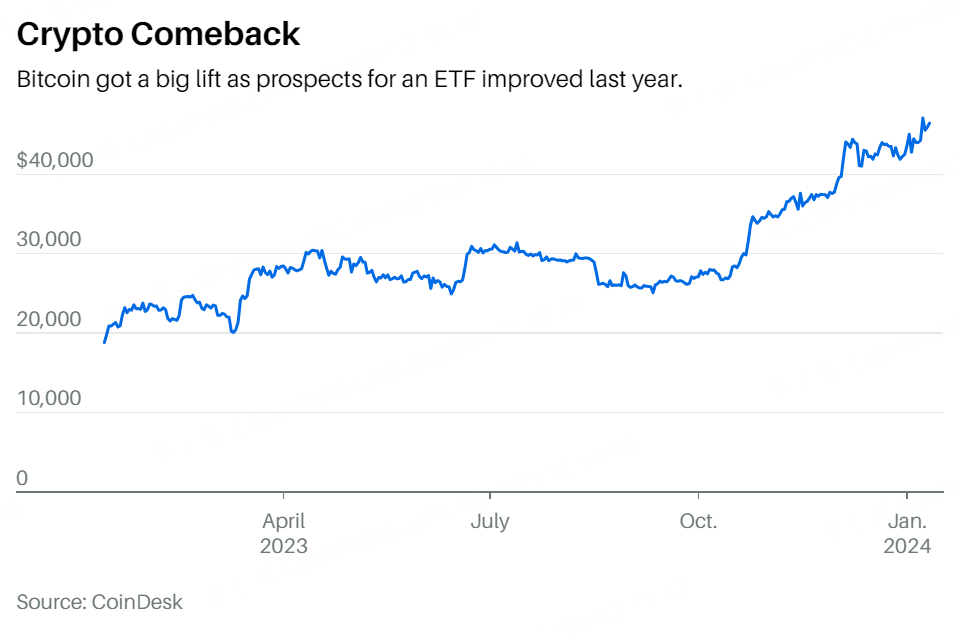The launch of Bitcoin exchange-traded funds has given crypto its first shot at the Wall Street big leagues. Now it faces the real test: Can it become more than a fringe asset?
Bitcoin ETFs are a prize the industry has sought for years, arguing the products would open up cryptocurrency to far more investors. Boosters say the ETFs will finally let Bitcoin muscle into the $100 trillion in portfolios managed by institutions like pension funds and financial advisors. For an asset whose total market value sits at $900 billion, they argue, it won’t take much to move the needle on price.
“If even a small fraction of 1% of the assets under management were allocated to Bitcoin, it would have a huge impact,” says Fred Thiel, CEO of Bitcoin-mining company Marathon Digital Holdings.
But crypto investors shouldn’t pin their hopes on a sudden influx of capital. Getting Bitcoin into institutions’ portfolios may take years. And it’s far from certain that advisors will warm up to Bitcoin as anything more than a novelty or alternative-asset held on the margins.
The first hurdle is logistics. Nearly a dozen Bitcoin ETFs are now on the market, following a greenlight from the Securities and Exchange Commission to launch the products. Bitcoin ETFs from BlackRock, Fidelity Investments, Invesco, and WisdomTree are trading, for instance. And the world’s largest Bitcoin fund—the $28.6 billion Grayscale Bitcoin Trust —instantly converted into an ETF.
As a relatively new asset class, though, the ETFs will need to be vetted by financial advisors. And unlike stock or bond funds, the ETFs may need to go through far more rigorous due diligence and compliance reviews to make it onto the platforms of the banks with the biggest teams of financial advisors. Firms such as Bank of America, Morgan Stanley, and UBS manage hundreds of billions in assets and could make or break the ETFs, depending on how much their advisors buy for clients and allocate to portfolios.
“There are all these boring details that are very important to what moment in time the ETFs can access these platforms,” says Steve Kurz, global head of asset management at Galaxy Digital, which helped launch the Invesco Galaxy Bitcoin ETF.
How much new demand is priced into Bitcoin isn’t clear at this stage. The token is up more than 75% in just the past three months and it didn’t go gangbusters on the approvals, trading up around 1%, to $46,400, the day after the SEC signed off.
Backers point out that the Bitcoin market is still relatively tiny and thinly traded and isn’t structurally large enough to price in a flood of institutional capital. In crypto, even “a billion dollars is a lot of money,” says 21Shares co-founder Ophelia Snyder, whose firm helped launch the ARK 21Shares Bitcoin ETF.
The company with perhaps the most at stake is Coinbase Global. Its stock has been on a tear, thanks to ETF fever, and CEO Brian Armstrong in a CNBC interview heralded the approvals as a ”monumental step” for crypto and Coinbase. As the industry sees it, Bitcoin ETFs will do for crypto what Starbucks did for coffee.
Coinbase bulls argue that the ETFs will lift all crypto ships, including alt-coins like Ether. Coinbase is building a crypto ecosystem, the argument goes, and as more investors warm up to the asset class, it will benefit. Even if Coinbase loses some trading volume in Bitcoin, alt-coin trading will more than make up for it, according to Needham analyst John Todaro, who rates the stock a Buy.
The bear case is that Bitcoin ETFs will cannibalize traders, who may find it simpler and cheaper to use an ETF rather than a token exchange—paying commissions and losing a bit on bid/ask spreads. Coinbase will be the custodian for most Bitcoin ETFs, earning some fees. But the activity is less profitable than the company’s retail trading business, where it can collect more than 1% of a transaction through fees and bid/ask spreads.
“We expect fundamentals to serve as a painful reality check in coming quarters,” wrote Mizuho analyst Dan Dolev in a research note, seeing the stock fall way back to his target of $54 from recent prices around $141.
The SEC approved Bitcoin ETFs grudgingly—essentially after being pushed to do so by a court. SEC Chair Gary Gensler has made it clear he still views Bitcoin skeptically, warning that investors shouldn’t mistake it for a traditional commodity like gold.
Several cases could still derail the industry’s aspirations to go mainstream. Next Wednesday, for instance, a judge will hear oral arguments in a case between the SEC and Coinbase in which the agency is accusing the firm of illegally operating an unregistered securities exchange. Coinbase has said it is obeying the law. How the case plays out could have a big impact on its revenue model, potentially curtailing vast swaths of trading and services.
For now, the industry is basking in a victory. Analysts and fund sponsors are talking up plans for the next big product, an ETF holding Ether, the second-largest token. That might be a bigger lift, though, as regulators generally view Bitcoin as a commodity—exempting it from securities laws—but have made no such assurances about Ether.
One company that seems skeptical of it all is Vanguard. The index fund giant says it won’t make Bitcoin ETFs available on its brokerage platform. Vanguard says the products “do not align” with asset classes such as equities, bonds, and cash, which the company views as the “building blocks of a well-balanced, long-term investment portfolio.”
Whether Bitcoin will ever be that building block remains to be seen.

Comments